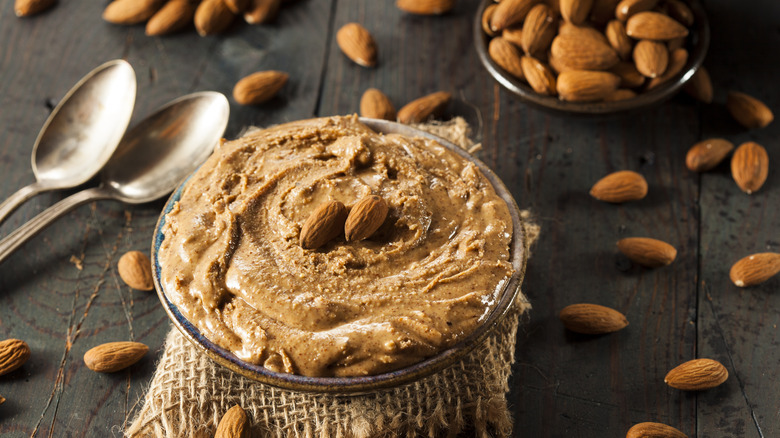These Peanut Butter Alternatives Are Lower In Saturated Fat
Depending on who you ask, people may give you conflicting information about saturated fat. One friend might tell you that saturated fat can clog your arteries and increase your risk of heart disease. Your friend who lives and breathes anything about the keto diet will say that it's carbs, not fat, that are unhealthy. The American Heart Association suggests getting no more than 6% of your daily calories from saturated fat, which comes to 13 grams for a 2,000-calorie diet.
That saturated fat can quickly add up, even if you never touch meat. Butter, cream, and cheese all have saturated fat. Even though coconut oil was all the rage a few years ago, just a tablespoon of coconut oil already puts you at 11 grams of saturated fat. Other plant-based oils and foods are also high in saturated fat, including peanut butter. Two tablespoons of peanut butter have 3 grams of saturated fat. Although that's relatively low compared to peanut butter's total fat count, you can turn to almond butter or sunflower butter to trim your saturated fat.
Sunflower butter and almond butter compared to peanut butter
You can cut your saturated fat in half by choosing almond butter or sunflower butter over peanut butter. Two tablespoons of sunflower butter have 1.5 grams of saturated fat, while the same amount of almond butter has 1.3 grams. That doesn't mean either of those peanut butter swaps is lower in calories or fat, though. Both have about 10 more calories per serving than peanut butter and a little more than a gram of fat calories.
What that does mean, however, is that you'll get more of the heart-healthy monounsaturated fat. Peanut butter has 6.6 grams of monounsaturated fats, compared to 12.5 grams in sunflower butter and 10.3 grams in almond butter. Specifically, both sunflower butter and almond butter have more oleic acid than peanut butter. Oleic acid is an omega-9 fatty acid that helps to reduce cholesterol and limit inflammation. Peanut butter tops the three types of spread with 7 grams, but the other butters have just a gram or two fewer than peanut butter. Almond butter beats out the others in terms of fiber with 3 grams.
Health benefits of nut and seed butters
Whether you choose raw almonds, roasted almonds, or almond butter, you can turn to them to lower your LDL cholesterol levels as part of a healthy diet, according to a 2013 study in the Journal of the American College of Nutrition. Almond butter improved HDL cholesterol levels after just four weeks. The health benefits of eating almonds every day go beyond cholesterol. A 2021 review of clinical trials in Nutrients found that almonds can be used to help control your weight, blood pressure, and cognitive health. Almonds also help improve the diversity of microflora in your gut.
A 2020 article in Food Science and Nutrition identified the specific compounds in sunflower that provide some health benefits. Vitamin E, enzymes, phenolic compounds, carotenoids, and peptides work as antioxidants that knock out free radicals to lower the risk of high blood pressure, cardiovascular disease, and neurodegenerative diseases. Tocopherols in sunflower oil work to reduce inflammation that impacts people with bronchial asthma, osteoarthritis, and rheumatoid arthritis, according to a 2014 article in the International Journal of Research and Development in Pharmacy and Life Sciences. The 99 grams of magnesium in sunflower seeds can help preserve your nerve functioning and could be useful for people with muscle cramps, hypertension, and migraines. Phytosterols, particularly beta-sitosterols, might help reduce the risk of postmenopausal breast cancer.



